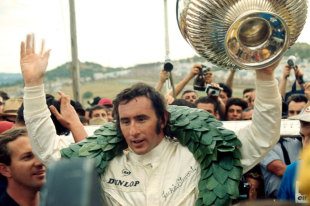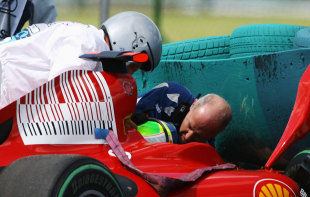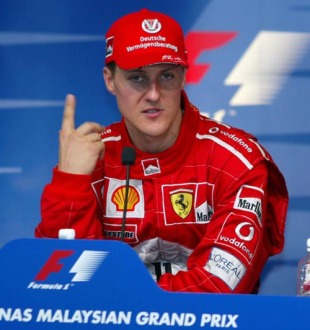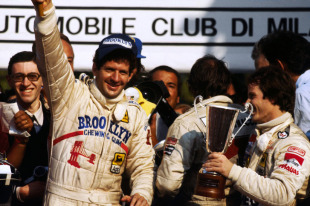
- Drivers:
- Timo Glock
- |
- Nico Hülkenberg
- |
- Felipe Massa
- |
- Nico Rosberg
- |
- Jody Scheckter
- |
- Michael Schumacher
- |
- Jackie Stewart
- |
- Mark Webber
Formula One is often billed as the ultimate display of man and machine, trained athletes skilfully operating some of the most advanced technology you can find on four wheels. But while there is no doubt that F1 drivers are some of the most physically fit specimens you are ever likely to meet, little is ever made of that other vital component: the mental strength needed to operate in such a highly competitive environment, fighting fortnightly under the glare of the media spotlight as your body attempts to recover from a series of punishing trips across timezones.
"The mind is everything," Sir Jackie Stewart admitted in a 2004 interview. "All the boys in Formula One today have gifts from God and there's 20 of them. Then there's the top six, then the extraordinary three.
"But the genius is the one who takes it to another level. That is Michael Schumacher today, just as there once was Fangio, Clark, myself if you like, Lauda, Prost, Senna - the absolute multiple champions. And it's always the head that took them there."
Given the role that a strong mental game can play in a successful season, it would not be illogical to presume that a sports psychologist could form an effective part of a driver's competitive arsenal, alongside his trainer and his race engineer. But in the paddock, a reliance on psychology and psychotherapy still carry the same overtones of vulnerability that they do in much of the outside world.
To many, admitting to using a sports psychologist to improve one's game is tantamount to admitting a weakness. But one driver who has been open about the potential benefits of therapy is Brazilian racer Felipe Massa, who has recently returned to his stride after a two-season slump that saw him face regular criticism. "The bad results influenced the psychological side," the Ferrari driver told Portuguese language Revista Espn magazine in July. "I found a psychologist and went through therapy. I will try everything right until the end, because I believe that things will change."

While Massa's is an extreme example - the popular Ferrari driver had to deal with the psychological impact of a life-threatening accident suffered in 2009 - picking oneself up after a bad performance is a regular feature of an F1 driver's life. To an outsider, staying motivated in a difficult season looks to be one of the greater challenges a driver can face on a regular basis, but the men behind the wheel tend to disagree.
"It's really normal in sport, y'know?," says Chinese Grand Prix winner Nico Rosberg. "Sport is all about highs and lows, and it's the lows that are the difficult ones. I myself have learned to push through them and come back stronger, and that's motivation alone: you want to come back on the other side even better than before and do a very great job. … I have learned over the years: that's racing. You have good phases and sometimes bad phases, then a good phase comes along again. The bad phases are the ones that teach you the most, and I always try to take the most out of those to emerge so much stronger."
Mark Webber agrees. "Adversity comes with the territory," the Australian admits. "If you have a very low ambition and set your goals very conservatively then it might be a bit more stable, but when you want to achieve great things or special things, there's going to be some adversity along the way and getting back up from the canvas is part of the rules. Sometimes our failure is part of success: we need to have that [failure] to be successful."
Speaking to the FOTA Fan Forum in Stuttgart over the summer, Nico Hulkenberg said that the job itself was motivation enough: "There are always obstacles which you just need to overcome," the Force India driver acknowledged. "At the end of the day I must say we have a dream job in Formula One, flying all over the world, driving the cars, working with fantastic people, and it is simply a lot of fun. When you have a bad result you get upset and seek the reason, which in itself provides renewed motivation."
But regular setbacks can be demotivating, and after a string of sub-par performances how does a driver find the determination to keep on going?

"In our sport we are privileged to drive these cars and for us it is a big excitement to be involved in this sport and it's natural that you want to do the best that you can do," explains Michael Schumacher. " 'It doesn't matter what happened yesterday' is something that you learn very quickly. It only matters what you do at the moment and you might do in future. That's what it's all about. I guess it's a school that you go through in the early days in karting and that's what you grow up with. Partly it's a character that you have or build up, so to all of us I guess [staying motivated is] very natural."
Timo Glock takes a different perspective: "Every race is a new race, and brings renewed opportunities. It is the same with each season. Next year the cards will be reshuffled and that is why I don't suffer motivation issues."
Drivers learn to find motivation from a variety of sources, and this year the added challenge of an up and down season has given some of the grid added enthusiasm.
"For me [the changeable season is] an extra motivation," Rosberg said in Korea, "because I come here and I'm not sure that I'm definitely going to be in the same position as in Suzuka. There's a chance that I will be able to be a lot further up and fighting for much better positions, so it's quite a nice thing."
One element of a driver's psychological preparation is learning how to keep their competitive aggression at bay when competing, channelling the energy so that it becomes productive. After all, they don't call it 'turning a wheel in anger' for nothing.
"I've been crazy as hell and felt so mad I could have jumped out of the car at 200mph," 1979 world champion Jody Scheckter confessed. "I've changed gears without taking my foot off the accelerator, wanting to destroy the engine. I used to get really upset in practice and qualifying; that was the worst time. The races were more about controlled aggression. But when you're really desperate and there's only a few laps left you get angry and it gets really dangerous. But you just don't care. You hold your foot down."

Aggression and its derivatives are motorsports buzzwords, heard in press conferences around the world. A quick scan of any recent press releases talks of teams being aggressive with their strategy, their tyre choice, or their gear ratios, while drivers often use the world to describe their laps in qualifying.
A Formula One driver needs a certain amount of aggression on track, for it is that which makes him seek out impossible gaps and create overtaking opportunities where none exist. But that aggression must be tempered with a certain calm, for it is in that sweet spot that the strongest performances lie.
From popular heroes like Ayrton Senna and Gilles Villeneuve or the modern, more love 'em or hate 'em Lewis Hamilton and Pastor Maldonado, aggressive driving has often resulted in some legendary performances. But aggressive drivers are also remembered for those times when it all went wrong, when the competitive instinct clouded the mind, resulting in the wilful disposal of a clutch of world championship points.
Taming the beast and keeping the speed is the struggle a racing driver faces every time he gets behind the wheel. The same desire to compete that motivates him to keep on going during a slump can be dangerous if not properly channelled.
Really, it's all been said more eloquently before. In 'If', his catch-all guide to life, Rudyard Kipling adroitly summed up a racing driver's lot: "If you can keep your head when all about you are losing theirs… If you can meet with triumph and disaster and treat those two imposters just the same; If you can make one heap of all your winnings and risk it on one turn of pitch-and-toss, and lose, and start again at your beginnings and never breath a word about your loss… If you can fill the unforgiving minute with 60 seconds' worth of distance run - yours is the Earth and everything that's in it…"

